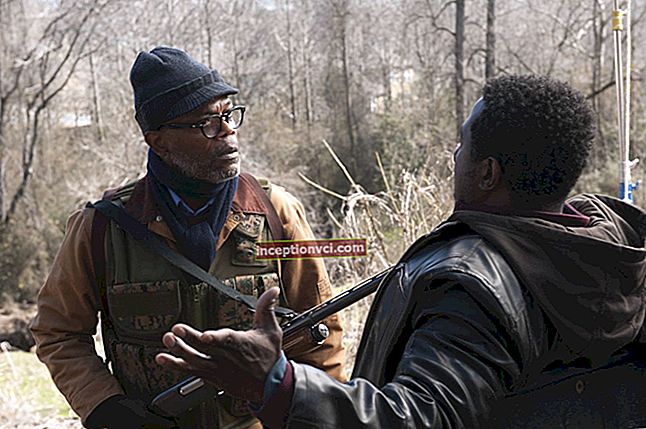GLADIATOR
Genre: action, drama, adventure, history, 2000, USA-UK, 171 min.
Producer: Ridley Scott
Cast: Russell Crowe, Joaquin Phoenix, Connie Nielsen, Oliver Reid, Richard Harris, Djimon Hunsu

"FINGERS DOWN"
The history of the film began with a painting by Jean-Léon Jerome, known as Thumbs Down.
A reproduction of this painting lay on the table in front of Ridley Scott. Also seated in front of him were producers Walter Parke and Douglas Wick, telling the story of screenwriter David Franzoni about an ancient Roman gladiator. But Ridley, it seems, did not even really listen to them, only glancing dreamily at the picture. Later he said: "When I saw this reproduction, I realized that I was in trouble." He, like the writers, was attracted by the fact that at that time all roads led to Rome, all the roads of Rome led to the arena, and in the arena for entertainment people forgot about important problems. Scott himself said that the behavior of people seems strange to him, because it does not change, only the costumes change. And since the motives of the ancient Romans do not seem alien to a modern person, it means that modern relations will be acceptable to the Romans. It was impossible not to seize the opportunity to write a script "from the opposite". It remained to understand how Rome relates to us now, what relation the Colosseum has to the United States. In fact, to create a story not about Ancient Rome, but about Los Angeles a thousand years later. The Colosseum is the Dodgers Stadium, the writers realized.
Since the script was written “from the opposite direction,” there was no doubt about the relevance of the story for the modern viewer. But meanwhile the genre of "peplum" in Hollywood has not had success for the past 40 years. And the creation of a large-scale historical film strip meant a very big risk. Fortunately, the director, who grew up watching the epic films Ben Hur, Spartacus, and The Fall of the Roman Empire, was right. Reasoned that at the dawn of the new millennium, it is high time to recall the most important period in the last 2000 years. And I was ready to take risks. The only thing left to do was to abandon the dusty templates. Otherwise, the film would have come out with a series of scenes with togas, endless chewing of grapes, drinking wine from goblets and would have safely failed at the box office.
Actually, that is why the writers went to Ridley, who had already shot 10 films by that time. And he deservedly earned a reputation as an original director, who most of all appreciates the opportunity to create new worlds in cinema. It was such a person who could resurrect the sword and sandal genre. Did he know in advance (and many people attribute this quality to Ridley) that he would have to crawl on his stomach in the munching mud, languish from the forty-degree heat, finalize the script right during filming and not sleep at night? Unknown. Only one thing is clear - it was not in vain.
"WE WILL SEE STILL, BUT NOT NOW"
In 1998, however, the focus was not on future success, but on how to cope with numerous challenges.
On the one hand, the film was a serious drama, on the other, it was a fantastic performance, and difficulties arose immediately. For example, it was important to find the right tone of dialogues - not too modern and not too archaic, in order to captivate the viewer, and not let him fall asleep. And the first readings with the actors were unanimously declared a failure. But the problem of the plot arose much more acutely.
In general terms, it was clear that the plot would develop within the genre and be built on the canonical model of Homer's Odyssey. Which, not only for the United States, but for the rest of the world, is a favorite and traditional motive, realized both in Forrest Gump and in The Shawshank Redemption. Despite the seeming dissimilarity of these films, in each of them the central theme is a long return to happiness, a state of inner peace, achieved in a series of difficult trials.For "Gladiator" in such a hypostasis there is an eternal value - family well-being in his own home. By the will of fate, General Maximus becomes a gladiator and must go through the heat of the Colosseum to become free again. According to one version of the scenario, Maximus's family remained alive, according to another, Lucilla was dying. When they decided to focus on the death of the family, it became clear that the plot looms very dark, more like a story of revenge.
Ridley Scott had a serious suspicion that the story of a man who simply longs for the death of another person is not attractive and universal enough. And it will not be able to win the attention of many spectators. A similar opinion was shared by the studio, but on a different matter. She did not want to release a film that did not have a love story. And Ridley, in turn, was strongly against love scenes.
THE SCENARIO WERE HANDMARKED “STUPID! STUPID! STUPID! ", AND THE CORRESPONDENCE OF THE DIRECTOR AND SCENAROISTS ARE FUCK'S
The script was handwritten “STUPID! STUPID! STUPID! " or the official footnotes "Maximus must be brave, but not stupid", and each of the participants in the discussion of the script fiercely defended their point of view, not wanting to compromise. And the correspondence between the director and the scriptwriters was full of fuck'a (later all the correspondence was collected under one cover and entitled "Letters from the Front"). Fortunately, Gladiator did not happen what happened to Blade Runner. The film only benefited from heated controversy.
As a result, it was decided to make the heroes more endearing in order to achieve the necessary transformation of the film. From the story of a man who wants to take revenge and kill, to the story of a loving man who does not want to be a warrior and longs to return home. But how to return home if in the story the wife and child of Maximus are killed by the people of Commodus? It was here, when this question was posed, that the idea of the afterlife arose, which made it possible to develop the plot in a narrow dramatic channel not in breadth, but in depth. Not deviating one iota from the approved direction, the writing fraternity set about subtle portrayal of artistic images. As a result, the same Maximus became not just a great warrior, whom it is interesting to watch mainly for teenagers, but a full-fledged personality with his own pain, suffering, love and purpose. There is only one full-fledged female character in the film. But thanks to the discourse on the soul and the afterlife (not religion, but faith!), The audience also fell in love with the film. And Maximus in general turned out to be a dream for women - very strong and very loving.
By the way, the director and screenwriters demonstrated an enviable tolerance in a sensitive spiritual issue. They managed to touch it on a certain universal human level of faith without any connection with confessions, be it paganism or Christianity. For at the forefront they take the basic ideological tradition of non-termination of existence after death. The hero's goal - to overcome death and find love after it - completely changes the viewer's attitude towards him. The viewer begins to respect and empathize with him not for his strength and skills, but for the fact that he has to be strong.
Spiritual connection with loved ones became the leitmotif of the film. It sounds in the general's parting speech to his soldiers in Germany. “If you find yourself in green fields - do not be afraid! You are dead. You are already in paradise! " Continues with a dotted line in almost every conversation between Maximus and the gladiator Juba. It is illuminated not only through dialogues, but also with a masterful visual range. Already in the first minute of the film, Maximus smiles at the bird that has flown away, which makes it clear that he loves life and does not want to be at war. That is why, in the end, the death of the hero satisfies the viewer no less than the traditional happy ending. After all, Maximus meets with loved ones, achieves a dream that turns out to be wider than one life. Death turns into victory, into triumph, which makes the film less dark. And in a sense, even life-affirming.
Djimon Hunsu's character was originally supposed to be completely episodic, covering Maximus's wound. But in the process of rewriting the script, it gradually began to acquire more and more importance, talking about life after death. And the last word in the film remained with him: “We will see each other, but not now. Not now". True, this happened in connection with the tragic events on the set. However, more on that later.
"MOTOR!"
When filming began, the script was not yet finished and changed almost daily. The director's team conferred until late at night each time. And although Russell Crowe said that he did not have a single part of his body that would not have suffered during the filming, Ridley Scott had the hardest part. In addition to scenario battles and purely organizational issues, it was necessary to solve staged ones. “It's not difficult to stage 5 fights. It's hard to come up with 5 different fights, ”said Scott.
The first fight was supposed to be realistic, tough, rough, dirty and ugly. The Roman army defeats the Germanic tribes, but at a monstrous cost. At first, Ridley wanted to shoot German scenes in Bratislava. And he even developed with the artist a scene of a battle on a frozen lake, in the middle of which there was a small island with trees. But then he decided that it would be easier to do everything near London, and abandoned the idea with the lake. As a result, a forest was found suitable for Ridley's new vision of fighting the barbarians.
Moreover, this forest was soon to be cut down, which means that it could be spoiled in every possible way. That only added entertainment to the battle. True, the journalists tried to inflate a scandal out of this: Ridley Scott is burning the forest, it's awful! Ridley himself took such "sensations" calmly. He never had warm feelings for the journalistic fraternity, but he did not intend to be distracted from filming. Moreover, according to him, he “hadn’t been so good since Blade Runner.” Still, although the studio was trying to push through its ideas, for example, building the Colosseum in an old warehouse in Chatsworth near Los Angeles, Scott already had enough authority to dispose of resources as he pleased.
For example, Ridley deliberately set the main battle at the beginning of the film, because he believed that over time, people would get tired of contemplating violence. And the effect of its impact will decrease. A grandiose battle with barbarians already in the first minutes of the film allowed Scott to saturate the viewer with action. And to gain enough time in the plot in order to calmly show the development of images, without getting tired, without getting bogged down in a swamp of drawn-out combat scenes.
One and a half thousand soldiers for extras were hastily formed from among the local unemployed and students. Preparations for filming began at 4 in the morning, so that by 7 the actors were ready. It was more difficult to work with the Germans than with the Romans, since they had to diligently stain their hair. Whole teams of make-up artists were involved. And the extras before filming literally took mud baths right in their clothes. In general, Ridley was scrupulous about dirt. He believed that the main mistake of previous historical films was the inconsistency of the costumes. The fabrics and cuts were too decorative, theatrical and not casual. Therefore, in the Gladiator, armor and other items were worn and looked as if they were often worn and rarely taken off.
The director carefully followed the realism - he was above all for him. If the battle director offered a variant in which Maximus responds to the opponent's blow with several punches of his fist, then Scott asked if something could be done more suitable for the battle. For example, chop off the enemy's head. It was impossible to really cut off the head with an iron sword. It's still not steel, but it's not rubber props either. So the shooting was very dangerous and difficult for the actors. And Russell Crowe, in addition to the actual filming, also actively intervened in the script.
For example, according to the original plan, General Maximus was able to predict the weather. Before the start of the battle in Germany, he had to sniff and say: "Snow." Russell found this implausible: "So he is not only a great commander, but also the greatest weather forecaster in history?" Scott really wanted to shoot in snowy conditions, but found the actor's argument convincing. And then ... it really snowed on the set. Of course, it was impossible not to take advantage of this - natural snow looks much better than artificial. Therefore, Ridley's practice of shooting with 3 or 4 cameras at once came in handy. Thanks to this, the maximum of spectacular shots was “squeezed out” from each scene, and all “German” shooting took only 3 weeks. And, of course, if you had to lie on your stomach in the mud to set up a camera, the director did it personally. Not because the operators refused, but because he, being an excellent artist and expert in composition, did not want to trust anyone with the visual solution of the shot.
Ridley always loved to shoot in such a way that everything was heaped, so that there was dirt or dust all around. But if the dirt is more difficult to organize, then the accuracy is more dangerous for the actors. And yet, in German scenes, he had enough space to freely fix special fuses on the ground, throwing small piles of earth into the air. The actors looked at them in surprise, not understanding the purpose of the explosions and mud scraps. But their surprise lasted exactly until the moment they were allowed to see the footage.
"I WILL SPILL BLOOD THE WHOLE WORLD, IF YOU WOULD LOVE ME"
But Joaquin Phoenix's surprise was of a different nature. He absolutely could not understand why he was invited to this project. Looking at Russell Crowe, Connie Nielsen, Oliver Reed, Richard Harris, he felt like he was not among these professionals. He even stated that his arrival at the shooting was a mistake. That he would pay for the hotel himself, buy a ticket and return home. As a result, he calmed down and controlled his nerves. But he asked the film crew to be scolded off-screen by someone. So he could tune in the right way and "catch" the role. Then Russell said to him: "Why don't you just play, slug?" Needless to say, Phoenix was ecstatic, and things got better?
Joaquin got into the role so much that in the scene of the murder of the emperor he even fainted from overexertion. It is not surprising. Despite the fact that Russell Crowe became the face of the film, it was the role of Phoenix that was in many ways determining the quality of the dramatic component of the picture.
Positive heroes are always simpler, more transparent, therefore, here too, General Maximus is a kind of good Samaritan, too decent, honest and noble to live in this dirty world. In the character of Commodus, painstaking work is visible to create a clot of vices, which, with external evidence, would be as contradictory as possible, causing a cascade of emotions in the viewer. From rage to pity, from irritation to admiration.
RUSSELL SAID: "WHY DON'T YOU JUST PLAY, SLUMMER?" PHOENIX WAS FULLY DELIGHTED
It is difficult not to note the amazing plasticity and at the same time the integrity of the character created by Joaquin Phoenix. The main elements of his character are infantilism and the resulting capriciousness, cowardice and indulgence of desires. However, the adult childhood of the future emperor does not flow in smiles and pleasure. It is torn to pieces by deep pain, unconscious, at the level of instinct. Therefore, his world is distorted, ideals and morals are shifted. The great is merged with the vile, the life-giving is permeated with death, torment is inseparable from pleasure. Crying in the arms of a father, reconciling a rejected offspring with a parent renounced in a stream of fruitless reflections, sincere repentance instantly turns into hatred and murder. An unbearable need to be despicable, warmed by care, makes her sister want to.
This attraction is not corrupted lust, but a pitiful attempt to become dear, necessary for at least one person. He wanted love, but he received only lies, he dreamed of happiness, but the world presented him with mockery, he wanted to die ... but there were no tears.
Commodus is the most important and strongest element in the film's character gallery. His centralizing role is not only in leading the plot and revealing through himself the characters of other heroes. He is also the main figure who serves the development of dialectical unity in the struggle of opposites, unusual for a blockbuster philosophical thought. “Light cannot exist without a shadow,” Woland said, meeting the Moscow dawn. "You and I are brothers," said Commodus, thrusting a knife into Maximus's back. And again embracing, and again uniting love and hate. The striking similarity of enemies, with external strife, is perhaps the most powerful ideological line. Without pretending to be new, it seems to raise the whole of a typical visual attraction over a host of creations of the same kind.
Digressing from the specifics, Commodus and Maximus are driven by one goal - the achievement of a great dream that can only be embodied outside reality in the general supertemporal stream of being. Through generations, in eternity, in non-material space. For Commodus, this is the glory of Rome as the quintessence of the golden city of happiness, a utopia, sewn by the sun and prosperity. But in his mind he is one with his country, therefore, the veneration of the emperor is the veneration of Rome. Maximus understands that his family cannot be returned. However, revenge dawns, like the gates of liberation, opening into the unknown, which is still devoid of hellish torments. The community of aspirations continues. And in the means of achieving them - the conquest and submission of the masses by the blood of defeated enemies, serving base passions, a feast of spectacles and the joys of sin. The vicious ruler grants them to the raging mob, sitting on the king's bed and signing laws on an endless series of festivities. And the Spaniard delights the many-eyed monster in the stands of the Colosseum, so that it does not get bored in the vegetation of the time granted.
The relationship of the main characters can be traced in the relationship with Marcus Aurelius, who treats each of them as a son. But if the pious Maximus honored the wise ruler, then Commodus loved him. But I saw in him not a mentor, but a blood father. And he needed not education, not edification on the path of power, but in accepting himself in his original image. With a twisted soul, a heap of shortcomings and complete moral weakness. But for Aurelius, he was only a successor who did not deserve to take the throne. That is why the scene of the murder echoes the biblical legend of the betrayal of Judas. For this is a fatal and at the same time the best ending. A hollow philosopher who praised the measure of the true path of backgammon and their rulers. He forgot about his flesh of his own flesh, was unable to forgive, to come to terms with its inferiority. And so he doomed himself to eternal and useless glory, and his country to years of suffering.
Ridley Scott himself believes that if Marcus Aurelius had not knelt before Commodus, he would not have been killed. The son was used to seeing his father as domineering, and when he suddenly began to apologize, he saw weakness in him, realized that he was mistaken in him. And he was disgusted with him - as always happened with Commodus, one strong feeling was instantly replaced by another, sometimes the opposite. In one cut scene (it allegedly distracted from the main storyline), a young Caesar descends into the dungeon, approaches the bust of Marcus Aurelius and begins to violently hack him with his sword. And when he runs out of breath, he hugs the bust. In this episode, guilt and anger are very revealingly mixed. And it's a pity that most of the viewers could not appreciate all its charm.
Much has already been said about the relationship between Maximus, Marcus Aurelius and his son. All these relationships are perfectly revealed in the film. But there are those that are mentioned in the tape only in hints. It is not known for certain whether Maximus is the father of Lucilla's son.It is clear that they grew up together, but the film does not disclose the details of that life. One can only judge that there was a romance between Lucilla and the general, which for some reason turned out to be unsuccessful. DreamWorks bosses did not lose hope of getting their hands on at least one bed scene. But the matter was limited to only one kiss, when Commodus's sister came to the chained Maximus on a date.
By the way, Russell Crowe liked the kiss, and he said that he was not at all averse to repeating it. Ridley did not kiss with actress Connie Nielsen, but he was also imbued with her professionalism. And I was sincerely surprised why her career did not go uphill. Perhaps, he reasoned, this is due to the fact that directors are afraid to mess with too smart women. And Connie's intelligence is difficult to challenge, if only on the basis of the fact that she knows several foreign languages.
Returning to the only kiss in the film, it should be noted that this (and, of course, more) was desperately sought by Commodus in an effort to feel loved. But all his twisted attempts to get closer to his own sister on a physical level failed. Because he lacked the firmness to take that very first step and kiss her. He tried to win his father's love, but Maximus got it. He also received his sister's love. Commodus's anger, resentment and despair are easy to understand, it's hard not to empathize with him.
"HOW DID YOU WIN FREEDOM?"
Back in 1997, Ridley Scott got a glimpse of the great countryside in Morocco while filming Soldier Jane. The ancient village in the middle of the desert looked very atmospheric, but then the shooting in its vicinity was never organized. But two years later came out (later in the same locations filmed and "Kingdom of Heaven") was the best possible.
According to the plot, Maximus receives a serious wound, which becomes extremely dangerous in the absence of care. It was then that the weakened and widowed hero was picked up by a caravan of slave traders, who in those days were often met on the roads of the Roman Empire. The caravan makes its way to the province of Zuckabar. Where, as expected, it also has its own arena, and the strongest slaves are quickly retrained into gladiators.
The decorators managed to fit the newly built arena so successfully into the landscape of the ancient settlement that it seemed as if it had stood here for many centuries. The first test of the artistic taste of the props makers has passed on its sand.
If enough is now known about the widespread weapons of the Roman army, then about the gladiator's weapons it is only known that it was the most diverse. And included the most exotic specimens from around the world. Yes, gladiators used the Roman gladius sword (hence the word "gladiator") and the Roman throwing spear lilum. But the most famous fighters had a unique fighting technique. And largely due to her, they won fans in the stands. On the basis of fragmentary archival information and several old paintings, the Gladiator's team created samples of weapons - pikes, outlandish swords, nets, hooks. But mainly the imagination of the artists had to be relied on. Something had historical counterparts, something was completely fictional. But the main thing is that all the weapons looked as effective as possible and made it possible to diversify the tactics of gladiatorial battles.
GOOD LUCK WHILE ASSOCIATED WITH THE "GLADIATOR". BUT THE SHOOTING ALREADY WAS GOING SMOOTH TOO LONG ...
The first battle in Zuckabar captivates mainly not with cruelty, but with the originality of the plan, according to which the gladiators are divided into pairs, chained to each other, and one has a weapon, and the other has a shield. The fight turned out to be moderately cruel, bloody and spectacular, but the fight, in fact, is a montage. The director just needed to show that Maximus is gaining strength, killing, killing, killing ...
In addition to the fighting scenes, Zuckabar was important in that the last of the significant characters in the film, Proximo, finally entered the narrative.The owner of local gladiators, and in the past himself a former slave who fought for the amusement of the crowd. In the role of Proximo Ridley, Scott saw the remarkable and formerly very famous actor Oliver Reid. Moreover, even his biography was similar to that of the hero.
Proximo was a former gladiator whose zenith of fame was far behind. And in 1999, very few also knew about Reed's past successes. Which, however, did not diminish his professional pride in the least. Scott, planning to re-acquaint the modern viewer with an excellent actor, sent Reed an invitation to audition. Reed was offended: "Damn it, if they want to see how I can act, then let them watch my films!" But, fortunately, he decided that the auditions could still be visited, if only because Ridley had undertaken to pay for travel to London. And there Oliver could go, for example, to the theater.
Reed tried to refuse to read the unfamiliar text. One of his arguments was that he would have to read with glasses, and that would completely break the image. But Scott told him to pretend they were Roman glasses, and the audition went well.
Oliver was in great shape and seemed hungry for such a textured role as Proximo. The entire film crew was fascinated by his strong, tough, cunning, but somewhat strikingly principled character. And, of course, Ridley could no longer imagine in the role of Proximo someone else. Good luck has accompanied the "Gladiator" so far. But the shooting has already been going smoothly for too long.
"THE GOING TO DEATH WELCOME THE EMPEROR!"
Rome had to be portrayed as a large, bustling city, analogous to modern New York. Initially, it was clear that creating sets from scratch would be too expensive. And it would take too long. Therefore, while Ridley was working with the film crew in Morocco, the decorators was hastily building "Rome" in Malta. Fort Ricasoli, which the director discovered there during preproduction, was not built in the style of Roman architecture. But he did not reject it explicitly, as, for example, the Gothic buildings, therefore it seemed to Scott an ideal place.
It was necessary to create Roman streets, the interiors of the palace of Caesar and the Senate, and finally, the monumental Colosseum. This is where the difficulties began. For obvious reasons, it was out of the question to build the Colosseum on the correct scale. Then Ridley Scott, like James Cameron before him, figured out how to save money on decorations. Cameron only built one half of the Titanic. And twisted
by using mirrored inscriptions. And Scott made a fragment of a two-tiered arena, looping it up and raising it to a five-tiered arena using computer graphics. The scenery was somewhat transformed (for example, the senator's box and the emperor's box, located opposite each other - the same superstructure, only slightly modified), the volume was also achieved with the help of moving and changing the extras' clothes.
To reduce the number of frames requiring CGI intervention, the Colosseum's decorations and armor were designed to be strictly symmetrical for many gladiators. This made it possible to flip the film in a mirror during editing, so that the audience seemed to see that part of the Colosseum that was not actually built.
And if with computer graphics everything went like clockwork, then with the extras it was necessary to spoil the nerves. Filming on different days required from one to five thousand extras. It was too difficult for them to sit in one place and remain calm (or, conversely, rave - at the direction of the director). Therefore, they tried to leave the boring scenery as soon as possible and go home. I had to organize security teams that would follow the crowd, as is done in modern stadiums. And after filming, take the crowd out of the Colosseum one by one, in groups. In addition, I had to constantly monitor the extras. So that attributes that do not correspond to the era, such as sunglasses, do not get into the frame. But you can't keep track of everyone.And Ridley Scott is sure that the extras dragged some artifacts of the 20th century into the film.
As mentioned above, the script changed dramatically during the filming. And when the film crew arrived in Malta, all the necessary decorations were not yet ready. Some of the already built ones were not required by the director at all. But there was a need for others, which the artists and builders had never even heard of. According to the law of meanness, at first Ridley demanded for filming those sets that were planned to be built later. And those that were supposed to be filmed earlier had to be postponed for later. The decorators swore and worked in a wild rush. As in the case of the Colosseum, transformations helped out. For example, by changing the location of some tables, pillars, busts and shooting angles, one and the same room could be passed off as Caesar's office, as the Senate hall, or even as Yaucilla's bedroom.
Ridley wanted to show something absolutely colossal and insane on the screen. And that was how he saw the fight between Maximus and the rhinoceros. A test computer model of the animal was even created. But it turned out that in real life this animal is not very active, moreover, it is not amenable to training. And the scene with his participation would have cost $ 3 million ... The regime of the most severe economy forced the director to abandon his idea and completely focus on the scene with the tigers.
I also had to refuse, but due to the complexity of the production, from the battle with the violent barbarians riding on zebras. In fairness, it should be noted that replacing this battle with a reconstruction of the Carthaginian battle, Ridley did not greatly simplify his task. It took 2 months to develop the sketches alone. And the work in the confined space of the arena with horses, and even with chariots, was not sweet.
Filming the much more modest, compared to the Carthaginian, battle of Maximus with the tiger also took several days. Because the animals did not want to do what was required of them. According to the laws of Malta, it was forbidden to import tigers from abroad, so they had to look for local predators and trainers. More offensive was the fact that the tigers were filmed in such a way that many viewers suspected the CGI base of real predators. But if computer graphics were safe for actors and required only imagination and precise coordination of movements, then animals had to be monitored every minute. And depend only on their mood. The tiger could lie lazily for half a day, and then suddenly attack a person. Once a beast was allowed too close to Russell Crowe. And he waved his clawed paw literally 15 centimeters from the actor. He did not notice the moment after which a hundred surgical stitches could be required. In order not to disrupt the shooting, he was told about this only a few days later, when the work with the animals was completed.
One way or another, the film crew successfully coped with all the difficulties. Finally, the moment came when Ridley Scott could tell himself with relief that the job was almost done.
And the film is great. It remains to shoot only the final scenes, which do not require serious preparation, except for the rehearsals of Phoenix and Crowe. Everyone was so confident in the successful completion of the filming, which was only three weeks away, that the scriptwriter William Nicholson even left Malta and flew home. As soon as he flew home, he was urgently called back - Oliver Reid died.
"SHADOWS AND SHADOWS"
Oliver Reed, who seemed so healthy and strong. Oliver Reed, in a great mood and genuinely enjoying filming. Oliver Reid, who did not manage to act in several final scenes, in which his character was assigned an almost key role. He died at 62 on the morning of May 2, 1999 from a heart attack.
Even putting aside the moral side of what happened, we can safely say that Ridley Scott was shocked and refused to believe it. Reed's death meant that almost half of the film would have to be re-shot - all scenes with his participation.First in Malta, and then return to Morocco. How much time and budget it would take. However, Scott did not want to count those who would have paid off with the actor's insurance, which amounted to about $ 26 million. He didn't even want to look for some other performer for the role of Proximo.
Oliver Reed for most of the actors was a kind of mentor, whom they tried to look up to, he charged everyone with his energy. Finally, he created a gorgeous character, an incredibly powerful image that others just fell in love with. The image of a rude businessman, under which an ethical person somehow managed to hide, ready to prove himself at the right moment. And Ridley Scott didn't want Oliver's efforts to go to waste. He must complete the shooting by all means, and then the film will become a kind of monument to the actor.
It would seem that there is a better way for an actor to die, if not while practicing his favorite craft? But the most important scenes with his participation have not yet been filmed. The release of Maximus from custody and the epilogue in which Proximo buries a wooden sword, donated by Marcus Aurelius, in the sand of the Colosseum! Reed would have been pissed off by the fact that he was unable to complete the film.
Heated discussions with the writers resumed and long screenings of all the scenes filmed with Reed. In the editing room, among the scenes filmed with Reed in Morocco, there were several takes. They were now to be used in the film. It was with their help that Proximo was still able to free Gladiator.
It was decided to shoot at night. Instead of the deceased actor, his understudy goes to Maximus' cage, the viewer does not see the face, only the figure. And when a face appears for a couple of seconds, it's ... really Reed's face. Cut from Moroccan takes and computer-glued to the body of the understudy. By the way, I also had to correct the actor's beard. Because according to the plot in Zuccabar, Proximo had a more neglected appearance, and upon arrival in Rome he became neatly shaven.
Russell Crowe improvised here. He needed to say something in response to the words of Reed's stunt double (who was filmed from behind) opening the cage, and he asked, "Aren't you afraid of becoming a good person?" In response to this, Proximo, grinning, jerks his head and leaves. It would seem that this was originally conceived according to the script, but this is just an element of the previously filmed game by Oliver Reid.
So, Maximus was released, but Proximo still needed to be removed from the plot. Of course, it was impossible to just casually remark "Oh, by the way, he was killed." But how do you kill such a character? After all, he had to leave beautifully and at least say something before dying? And a close-up of the actor was needed. Fortunately, Reed helped out again. During the filming of Maximus' entrance to the arena in Zuccabar, Proximo shouts after him "We are just shadows and decay!" The camera was not turned off immediately, and after this cry, Oliver Reed quietly repeated "Shadows and decay ..." with a thoughtful look. In Morocco, this was cut out during editing. And now this phrase seemed to Scott ideal in the sense that it seemed to draw a line under the hero's life and stylistically did not get out of the canvas of the narrative. Let the audience think that these words were a proverb for the old slave owner.
One accidentally previously filmed phrase, an understudy sitting with his back to the soldiers running to kill him, and a personalized wooden sword in his hands add up to one image. And the viewer does not feel false, everything is directed and edited perfectly. Proximo left with dignity.
In the finale, Juba buries in the sand of the Colosseum, where Maximus died, small figures of his wife and son with the words “We will see you again, but not now. Not now". The ending of the film, according to Ridley Scott, now looked even better than the one that had been conceived earlier. The figurines in the film had more symbolic meaning than the wooden sword. After all, Maximus was looking for a meeting with his family, while Proximo's weapons meant only freedom found in the arena.And no matter how charismatic the slave trader came out with Oliver Reed, one should not forget about his cruelty. While the final appearance of Juba can be regarded as a triumph of completely positive characters over ambiguous and negative ones.
"DEATH SMILES EVERYONE,AND WE HAVE ONLY RIGHT TO SMILE HER IN ANSWER "
Released in 2000, Gladiator became one of the biggest box office successes of the decade. However, the gilded enthusiasm of film academics flowed like a river not only after the numbers of box offices. For Hollywood, this tape is like a long-awaited child for a barren family. After all, it was the revival of such a beloved and, importantly, profitable genre in the past. In fact, marking the desired continuation of heroic battles already in the field of modern technology. Ridley Scott's work gave strong hope for future records of filling cinemas and producers' wallets.
But is it all about the genre? Or is the secret of success in a universal story? After all, neither "Kingdom of Heaven" nor "Robin Hood", which followed "Gladiator" and filmed by Ridley Scott from a technical point of view, did not achieve even half of the love with which for 10 years viewers of all countries have been following the difficult the return of Maximus home.
The path home, marked by bloody battles and exciting adventures, is filled with temptations no worse than Homer's. The temptation of power, emanating from Marcus Aurelius, and from Commodus, and from the senators. The fleeting movement of the eyes of the beautiful Yaucilla in a light dress, the eternal glory of the winner of the arena. Everything is thrown away in pursuit of the goal. Revenge, freeing not so much from the hated enemy as from his own life, which turned into purgatory long before his death.
Is there a difference between modern man and a Roman slave at the beginning of the era? We are still fascinated by the performance, the same Edison trick, the same Lumière train, in the same crowd of onlookers we indulge in an insane feast, splashing saliva and sticking out our tongue. And Scott, unwittingly, became at the same time a materialization. And Commodus organizing the fun. And Maximus, cutting the space with a spectacle. And Proximo, returning from oblivion to the arena of the great Colosseum, as if on a wide screen, with a revived "peplum" on the shield.









